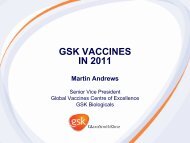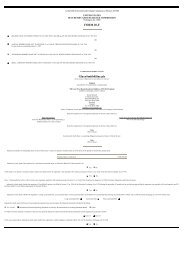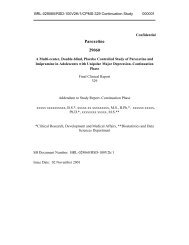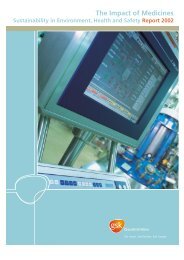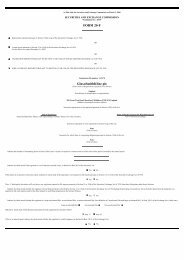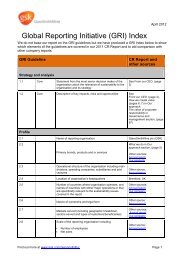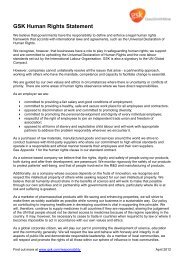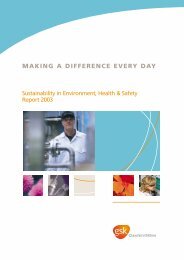GSK Annual Report 2002
GSK Annual Report 2002
GSK Annual Report 2002
You also want an ePaper? Increase the reach of your titles
YUMPU automatically turns print PDFs into web optimized ePapers that Google loves.
Compensation philosophy and programme development<br />
underscore GlaxoSmithKline’s commitment to a performance<br />
culture. Performance based pay, both base and variable, share<br />
awards, share options, performance and development planning<br />
and evaluation contribute to retention of key talent, superior<br />
performance and accomplishment of business targets.<br />
A commitment to flexible working through flexi-time,<br />
teleconferencing, remote working and flexible work schedules,<br />
recognises that employees work best in an environment that helps<br />
them integrate their work and personal lives.<br />
Communication and involvement<br />
An extensive programme of open, two-way communications<br />
stimulates employee engagement in GlaxoSmithKline’s strategy and<br />
day-to-day operations. This includes the publication of regular<br />
summary reports from Corporate Executive Team meetings, a<br />
Chief Executive Officer’s home page featuring presentations and a<br />
Q&A area, a Group-wide magazine, town hall meetings and video<br />
conferences. In <strong>2002</strong>, there was a satellite broadcast involving<br />
60 sites in 31 countries, and watched by an employee audience of<br />
around 30,000. Live video streaming and video on demand options<br />
are being developed as additional means of ensuring employees<br />
have access to the most senior levels of management, and as<br />
powerful tools for building culture and driving alignment across<br />
common goals.<br />
Share ownership schemes encourage participation as owners of the<br />
business, increasing awareness of short and long term business<br />
objectives. Global and local employee opinion surveys allow<br />
employees the opportunity to express their views and perspectives<br />
on important Group issues.<br />
Diversity<br />
The GlaxoSmithKline Diversity Strategy focuses on creating an<br />
inclusive work environment. The approach aims to enhance<br />
employee innovation and productivity by valuing and drawing on<br />
the differing knowledge, perspectives, experiences and styles<br />
resident in the global community. The Corporate Executive Team<br />
leads the Diversity Initiative with its key objective: to create and<br />
implement diversity strategies that measurably improve employee<br />
attraction, development and retention. Tailored initiatives are in<br />
progress to embed inclusive behaviours into GlaxoSmithKline’s<br />
culture and practices.<br />
GlaxoSmithKline is committed to employment policies free from<br />
discrimination against potential or existing staff on the grounds of<br />
age, race, ethnic and national origin, gender, sexual orientation,<br />
faith or disability.<br />
In particular GlaxoSmithKline is committed to offering people with<br />
disabilities access to the full range of recruitment and career<br />
opportunities. Every effort is made to retain and support staff who<br />
become disabled while working for the Group.<br />
Talent management and leadership development<br />
Development planning is a key element in performance planning<br />
for all employees each year. Reviews are conducted in each<br />
business and function to ensure that a diverse talent pool is fully<br />
developed to meet future business needs, and that successors are<br />
identified for key positions.<br />
Description of business GlaxoSmithKline 25<br />
Comprehensive leadership development opportunities are available<br />
to managers at all levels. These opportunities are targeted to help<br />
leaders to meet the challenges they face in a global organisation.<br />
They ensure leadership motivates and enables teams and<br />
individuals to do their best work. Development opportunities are<br />
innovative, based on peer interaction and idea exchange, and<br />
contribute to strategy deployment.<br />
Human Resources services and information systems<br />
GlaxoSmithKline’s human resource delivery strategy is designed to<br />
make the most of technology. Human Resources services and<br />
information are delivered through low cost, highly effective<br />
channels that make it easy for job candidates, employees, and<br />
retirees to access information about employment, compensation<br />
and benefits, policies and programmes. These include intuitive<br />
personalised web-based tools, available to employees in many<br />
locations.<br />
Property, plant and equipment<br />
GlaxoSmithKline has operating establishments in some 102<br />
countries. The geographical spread of the Group‘s activities is<br />
indicated in Note 38 to the Financial statements, ‘Principal Group<br />
companies’. GlaxoSmithKline conducts research and development<br />
at more than 20 sites and manufactures product at more than<br />
95 sites in 38 countries. Refer to ‘Research and development –<br />
Pharmaceuticals’ (page 14) and ‘Manufacture and supply’<br />
(page 13).<br />
GlaxoSmithKline has invested over £4 billion in its property, with<br />
a carrying value in the Financial statements of almost £3 billion,<br />
with a further £3.6 billion, at carrying value, invested in plant and<br />
equipment and assets in construction. In <strong>2002</strong>, GlaxoSmithKline<br />
invested £1 billion in new and renewal property, plant and<br />
equipment. This is mainly related to a large number of projects for<br />
the improvement and expansion of facilities at various worldwide<br />
sites. Property is mainly held freehold. New investment is financed<br />
from Group liquid resources. At 31st December <strong>2002</strong>, the Group<br />
had capital contractual commitments for future expenditure of<br />
some £382 million and in 2003 operating lease commitments of<br />
£168 million.<br />
GlaxoSmithKline’s business is science-based, technology-intensive<br />
and highly regulated by governmental authorities. It allocates<br />
significant financial resources to the renewal and maintenance of<br />
its property, plant and equipment to minimise risks of interruption<br />
of production and to achieve compliance with regulatory<br />
standards. The research and development and manufacture of<br />
active pharmaceutical ingredients require the use of chemicals and<br />
hazardous materials. GlaxoSmithKline observes stringent<br />
procedures and uses specialist skills to manage environmental risks<br />
from these activities. Environmental issues, sometimes dating from<br />
operations now modified or discontinued, are referenced under<br />
‘Responsibility for Environment, Health and Safety’ (page 26) and<br />
in Note 30 to the Financial statements, ‘Legal proceedings’.<br />
GlaxoSmithKline believes that its facilities are adequate for its<br />
current needs. The integration of Glaxo Wellcome and SmithKline<br />
Beecham operations has involved a series of announcements of<br />
rationalisation and potential disposal of a number of sites and<br />
properties. It is considered that there will be further changes.



